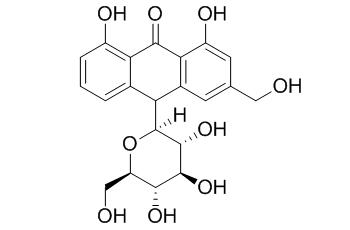Aloin
Aloe components (aloin, aloesin and aloe-gel) show anti-inflammatory effects, they can ameliorate intestinal inflammatory responses in a dextran sulfate sodium (DSS)-induced ulcerative colitis rat model. Aloin shows tyrosinase activity, it could be used as lightening agents in the treatment of hyperpigmentation disorders and cosmetic additives. Aloin is a potent proapoptotic agent, it showed a pronounced antiproliferative effect at physiological concentration (IC50 = 97 microM), caused cell cycle arrest in the S phase and markedly increased HeLaS3 cell apoptosis (to 24%).
Inquire / Order:
manager@chemfaces.com
Technical Inquiries:
service@chemfaces.com
Tel:
+86-27-84237783
Fax:
+86-27-84254680
Address:
1 Building, No. 83, CheCheng Rd., Wuhan Economic and Technological Development Zone, Wuhan, Hubei 430056, PRC
Providing storage is as stated on the product vial and the vial is kept tightly sealed, the product can be stored for up to
24 months(2-8C).
Wherever possible, you should prepare and use solutions on the same day. However, if you need to make up stock solutions in advance, we recommend that you store the solution as aliquots in tightly sealed vials at -20C. Generally, these will be useable for up to two weeks. Before use, and prior to opening the vial we recommend that you allow your product to equilibrate to room temperature for at least 1 hour.
Need more advice on solubility, usage and handling? Please email to: service@chemfaces.com
The packaging of the product may have turned upside down during transportation, resulting in the natural compounds adhering to the neck or cap of the vial. take the vial out of its packaging and gently shake to let the compounds fall to the bottom of the vial. for liquid products, centrifuge at 200-500 RPM to gather the liquid at the bottom of the vial. try to avoid loss or contamination during handling.
Bio-protocol2018, 9(14):e3301
Antibiotics.2022, 11(4), 510.
The Journal of Agromedicine and Medical Sciences2018, 4(1)
Bioinformatics 2024, 586957
Int J Mol Sci.2019, 20(11):E2734
Molecules.2024, 29(5):1171.
Fitoterapia.2015, 100:179-86
J Pharm Biomed Anal.2024, 251:116444.
Front Nutr.2024, 11:1507886
Molecules.2019, 24(12):E2286
Related and Featured Products
Chin Med J (Engl). 2002 Dec;115(12):1859-62.
Aloin, cinnamic acid and sophorcarpidine are potent inhibitors of tyrosinase.[Pubmed:
12622939]
To evaluate the effects of Aloin, cinnamic acid and 15 other kinds of natural chemicals on the activity of tyrosinase, in order to provide lightening agents in the treatment of hyperpigmentation disorders and cosmetic additives.
METHODS AND RESULTS:
Tyrosinase activity was estimated by measuring the oxidation rate of L-dopa. Inhibition of the enzyme was deduced according to the Lineweaver-Burk plots compared to the control. Cadabine, paeonal, farrerol, evodin, cinnamic acid, Aloin and sophorcarpidine had different levels of inhibition of tyrosinase. The inhibitory rates of cinnamic acid (2 mmol/L, 0.5 mmol/L), Aloin (2 mmol/L) and the rest were significantly higher than that of hydroquinone (0.5 mmol/L) (P < 0.05).
CONCLUSIONS:
Tyrosinase activity can be greatly inhibited by cinnamic acid, Aloin and sophorcarpidine, of which sophorcarpidine functions as an uncompetitive inhibitor, compared to Aloin and cinnamic acid, which are mixed-type inhibitors.
Cancer Biol Ther. 2007 Aug;6(8):1200-5.
Antitumor effects of a natural anthracycline analog (Aloin) involve altered activity of antioxidant enzymes in HeLaS3 cells.[Pubmed:
17726368]
METHODS AND RESULTS:
The antiproliferative and cytotoxic potential of the natural anthracycline Aloin from Aloe vera was tested on human uterine carcinoma HeLaS3 cells. Aloin showed a pronounced antiproliferative effect at physiological concentration (IC50 = 97 microM), caused cell cycle arrest in the S phase and markedly increased HeLaS3 cell apoptosis (to 24%). In the concentration range of 20-100 microM, its action was accompanied by remarkable changes in the activity of almost all antioxidant enzymes: MnSOD activity was increased many fold, while CuZnSOD and iNOS activities were inhibited. Moreover, inhibition of CuZnSOD was shown to occur by direct Aloin interaction with the enzyme.
As catalase activity was not changed, it is suggested that such conditions were responsible for antiproliferative and cytotoxic effects owing to accumulation of H2O2.
CONCLUSIONS:
Aloin alone was a more potent proapoptotic agent than a 2 Gy fractional dose of ionizing radiation or a combination of the two.
Compared to other currently used therapeutics, Aloin, due to its less undesirable side effects and antimetastatic potential, may prove to be the agent of choice on which clinical protocols for the treatment of human cervical carcinoma should rely in future.
Life Sci. 2011 Mar 14;88(11-12):486-92.
Dietary aloin, aloesin, or aloe-gel exerts anti-inflammatory activity in a rat colitis model.[Pubmed:
21277867 ]
Aloe has been a very popular folk remedy for inflammation-related pathological conditions despite the lack of studies reporting its efficacy in vivo. The present study evaluated the anti-inflammatory effects of aloe components (Aloin, aloesin and aloe-gel) known to be biologically active in the rat model of colitis.
METHODS AND RESULTS:
Male Sprague Dawley rats were fed experimental diets for 2 weeks before and during the induction of colitis. Drinking water containing 3% dextran sulfate sodium (DSS) was provided for 1 week to induce colitis. At the end of the experimental period, clinical and biochemical markers were compared. Plasma leukotriene B(4) (LTB(4)) and tumor necrosis factor-α (TNF-α) concentrations were significantly decreased in all groups supplemented with aloe components compared to the colitis control group (p<0.05). Animals fed both a 0.1% and 0.5% aloesin supplemented diet showed colonic myeloperoxidase (MPO) activities which were decreased by 32.2% and 40.1%, respectively (p<0.05). Colonic mucosa TNF-α and interleukin-1ß (IL-1β) mRNA expressions were significantly reduced in all animals fed Aloin, aloesin, or aloe-gel (p<0.05).
CONCLUSIONS:
Dietary supplementation of aloe components ameliorates intestinal inflammatory responses in a DSS-induced ulcerative colitis rat model. In particular, aloesin was the most potent inhibitor. Further studies are required for a more complete understanding of the specific mechanism of the action of these supplements.



